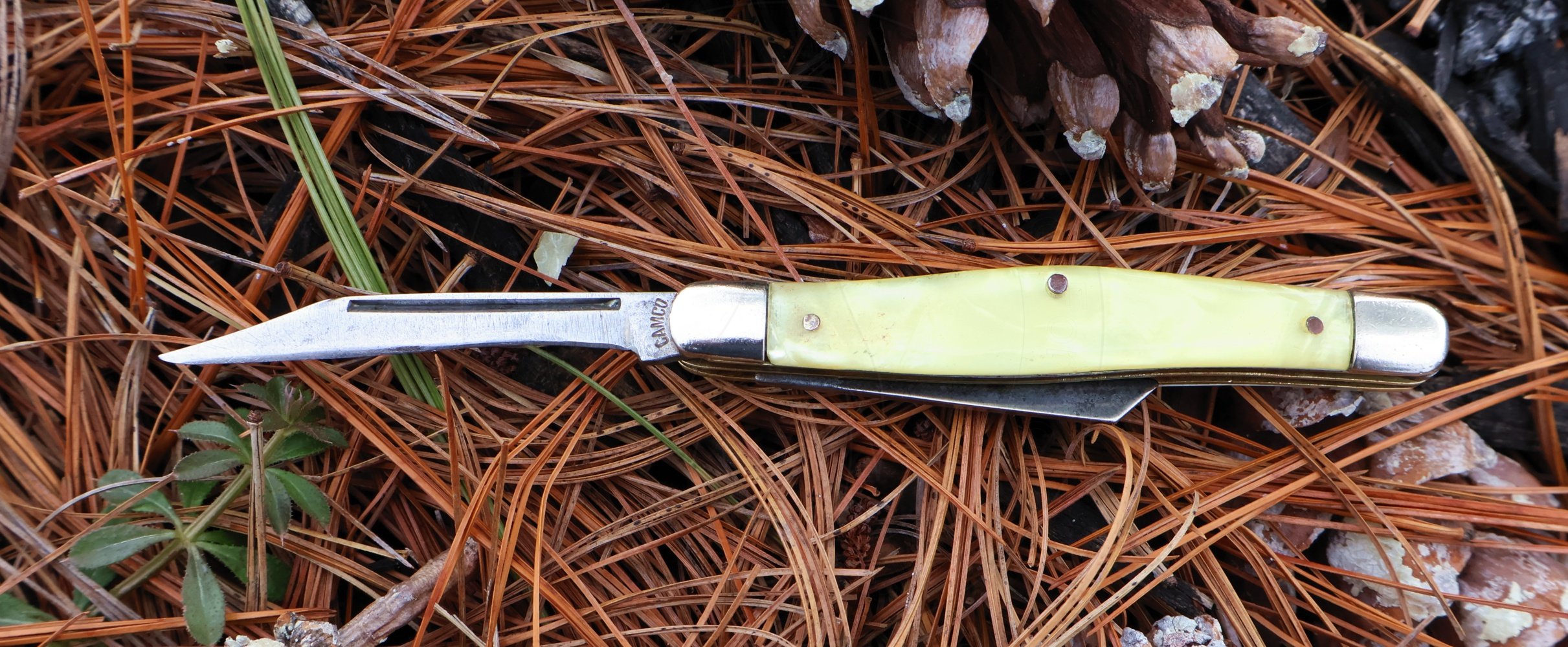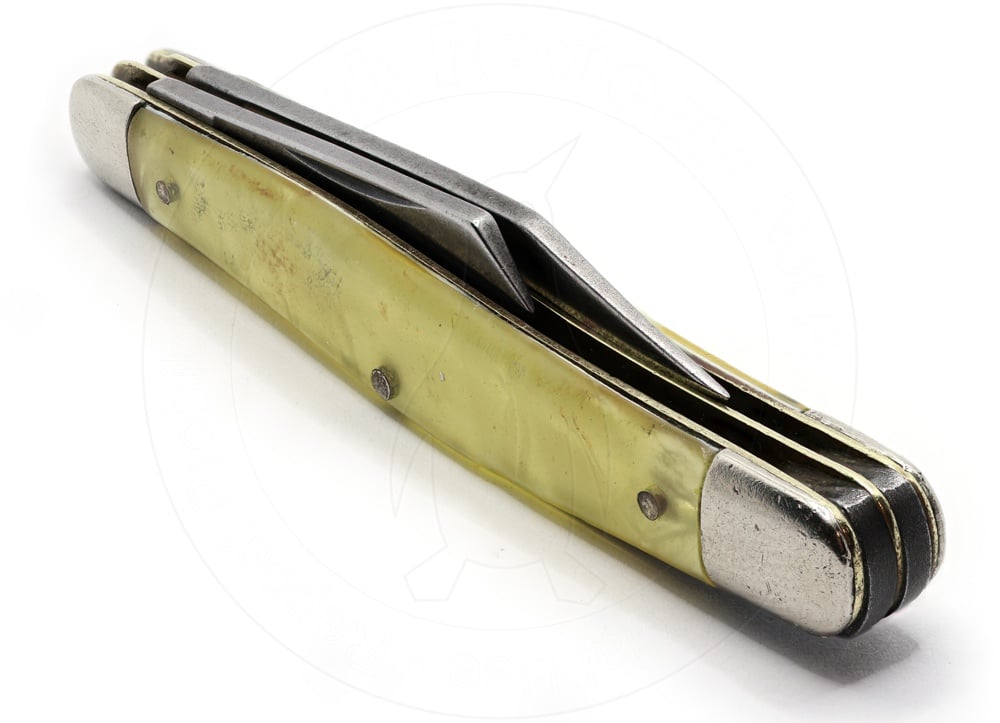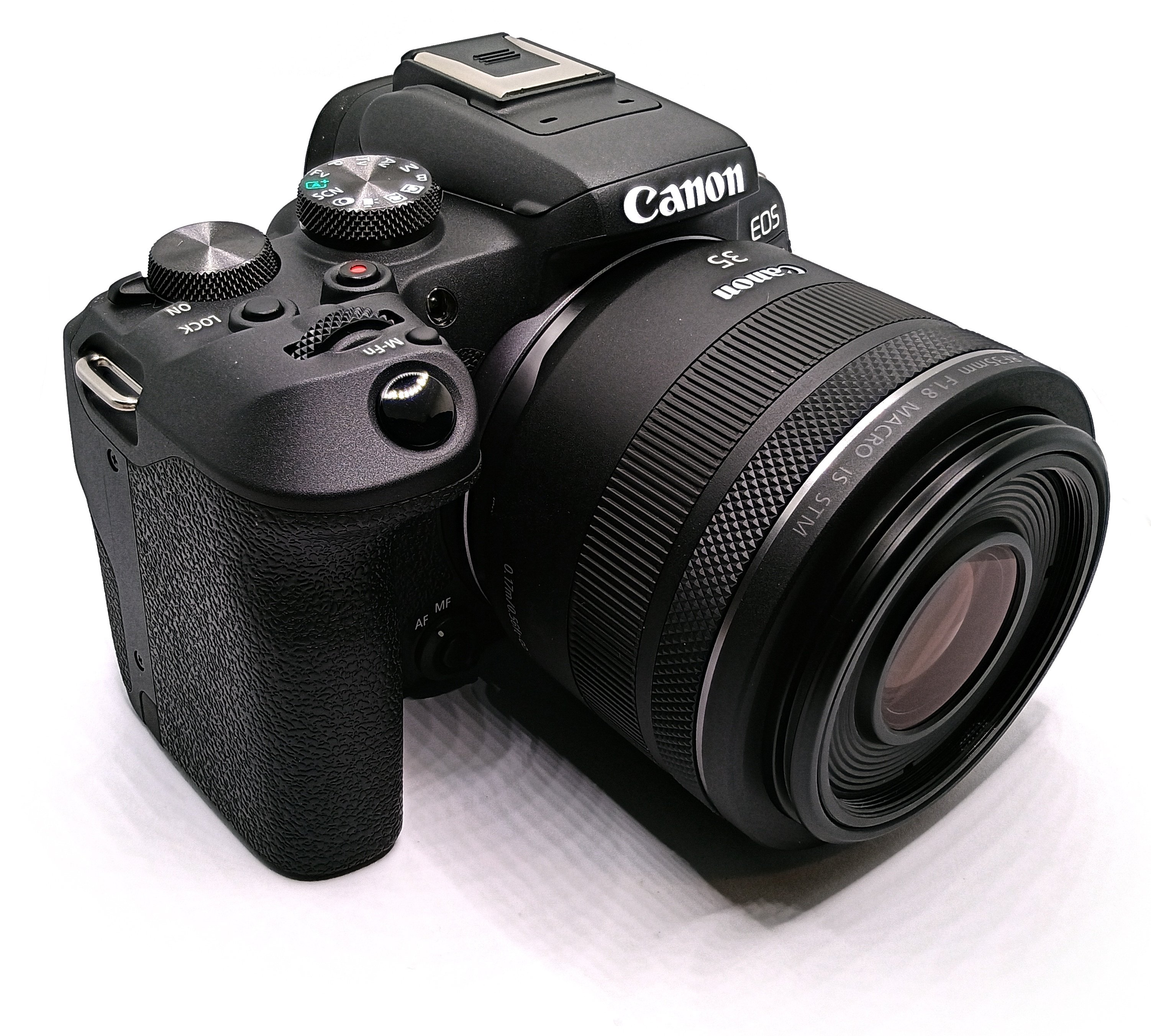It was just after dawn and I was awakened by a thunderstorm.
That by itself was another novelty; at home, back East, storms were solely the purview of the afternoon. If it rained in the morning rather than sundown you knew it was bound to be rain all day. Slow, miserable, grey, and boring.
But not today. There, for just a few minutes on the side porch of my older brother's cabin in the shadow of Jelm Mountain outside of Laramie, I watched the world disappear. The sky shook, the wind blew, and rain lashed against the windows. Mist closed in and drew its veil nearly up to the edge of the house, swallowing up the mountains and sagebrush and the prickly pair cactus, then the barn, then the truck. We floated alone in a roaring grey void.
And then, ten minutes later, it was over. My brother slept through it entirely. Didn't even budge.
The storm passed on, curtaining the town in sheets of rain on the horizon while a blue sky shone in the west and eventually, the sun rose over the tops of the anvil headed clouds and punched through, slicing the sky itself into ribbons of shadow and pillars of light. The mountains and the sky were perfectly reflected upside down in the puddles in the mud outside which quickly become mirror still, and steamed.
I was very nearly ten years old.
Today was an important day.
Every summer for five years running, my mother packed me up and shipped me out for no reason I was ever able to comprehend to stay with my brother for a few weeks, until the year he died. I think it was five trips, anyhow. You don't pay attention to that sort of thing when you're seven, because you're a self absorbed little shit and for you every day is a new universe and time may as well be infinite.
Maybe she just wanted me out of her face for a while. Or I suppose she might have thought it would force me to "build character." Well, it did. Whether she wanted it to or not.
Those summers were years of firsts for me. I ate my first bowl of Captain Crunch (with Crunchberries!) on the tailgate of my brother's dusty old Ford Ranger, in the middle of nowhere, using powdered milk made with ice cold river water. Sugary cereal wasn't allowed at home.
The first river caught trout I ever ate. The first time I drove a car -- my brother's truck, actually. With a manual transmission. My first time able to ride a bicycle completely out of the sight of any adult, all on my own, down the mile long dirt track to the main road and the mailbox and back, bringing a month's worth of mail with me including the very much coveted Cabelas catalog, which we did not have at home. It was my brother's mountain bike which was far too large for me. I had to stand sidesaddle on one of the pedals to even reach the ground with my feet, but I didn't even fall over once.
My first time lighting off a firework. I was barely even allowed to watch my father do that, in the few short years I was cognizant of anything and both of my parents were both still living under the same roof.
My first time firing a gun, my brother's little .22 revolver. Guns were very very evil and definitely weren't allowed at home.
It was easy to guess what my mother disapproved of because it was practically everything. If it was fun or any type of activity that was not preordained, it was not allowed. Things I was not allowed included nearly all television and radio (but NPR and PBS were okay, most times); all music that was above the level of about Raffi or, curiously, show tunes; having friends or being around the "wrong" type of people (which was basically everyone); privacy; any type of personal possessions; anything written, drawn, or typed with the expectation that it would not be rifled through and criticized relentlessly. Oh, and certainly knives. Those weren't allowed, either.
Approved activities largely consisted of studying, reading (approved books only), and getting good grades. Preferably where I could be seen doing it and therefore make her look good by association. Any good creative work I produced was shortly no longer mine. It was hers, taken away and to be paraded in front of her friends and associates, never to be seen by me again.
On this day my brother was taking me out into the field. This was something we did every year, after a couple of days bumming around town with his friends and packing. After this, it was goodbye to civilization (more or less) for a little over a week. And he was very adamant about one thing, when you ventured forth into the bush: You had to have your knife, your matches, your canteen, your compass, your map, and good boots. Really, he was an early forerunner to the modern EDC mindset.
Calling my brother an outdoorsman would be the understatement of a lifetime. He was a conservationist working for the local university. An actual conservationist, as in the scientific research and protecting trees and prairies and animals sort -- not just paying lip service to "protecting" parts of it so we can shoot at it later.
His work generally seemed to me to involve little more than traipsing out in the wilds all over hell and creation to remote ponds and gullies to take pH readings of the water and count frogs. Frogs were a bellwether species, he told me -- there's a new word -- in that tiny changes to their environment can have huge impacts on their numbers. If there's some new pollutant or subtle change to the climate we ought to know about you'll see it in the frogs first.
He lived in a little cabin out in the middle of nowhere, almost completely out of sight of everything. Just him and his dogs, and his falcon that he housed in the rickety old barn he'd converted into a kind of rookery. But where he was at home was not at home -- it was actually outside. I gather that he mostly thought of his house as a place to keep whatever stuff he did not have on him at the time.
He did not, in fact, teach me how to put together a tent. My dad did that. But this was different: with my brother all those years ago I spent my first night outdoors completely out of not only sight but also hearing of any type of civilization whatsoever. Not at a Good Sam or a KOA with yokels blaring warbly country music on shitty cassette players in the next bay over. No one crunching up the gravel drive a 2:00 AM. No trucks downshifting on the highway half a mile off. Instead, absolute silence.
And he always had his knife on him: the main one being a big fancy Swiss Army knife that I was immensely envious of just about ever since I could walk.
I vividly remember one time when I must have been about five, and my brother was visiting for a family birthday party. We were at Showbiz Pizza -- This was before they became Chuck E. Cheese. Someone picked up a slice of pizza and the cheese streeeeetched. My brother whipped out his Swiss Army knife and, literally, cut the cheese. Not with a knife blade. This motherfucker used the scissors. I still have no idea how he busted them out so fast. He must have been lying in wait.
My mother gave him A Look. I was sternly told afterwards never to repeat such a thing so long as I lived. So you bet your bottom dollar it became my life's ambition to do so, right at that exact second.
So truth be told, at first the knife aspect of the knife didn't hold much interest for me. It was the sheer variety of things that Swiss Army knife could do that were fascinating. You could have handed it to me without the knife blades on it and I probably wouldn't have cared one whit. It had screwdrivers for taking stuff apart (my brother used it to fix stuff on his rattly old truck all the time), a can opener for preparing dinner at camp, a little magnifying glass for looking at cool rocks and bugs, tweezers for getting out splinters, a toothpick for looking cool, a corkscrew for... some reason, and one of those leather punch awls with the hole in that nobody ever seemed to use for anything but still it was there and it was one more thing.
But today we were going out into the field, and I already had my compass and my canteen and my matches and my boots. This year my brother decided I was responsible enough, quite contrary to my mother's perpetual insistence, that I could have a knife.
So as a slightly early birthday present, he gave me this. It was just a little old unregarded trifle from the bottom of his tackle box. It was already quite well worn by the time he passed it on to me, and to him it was probably worth practically nothing.
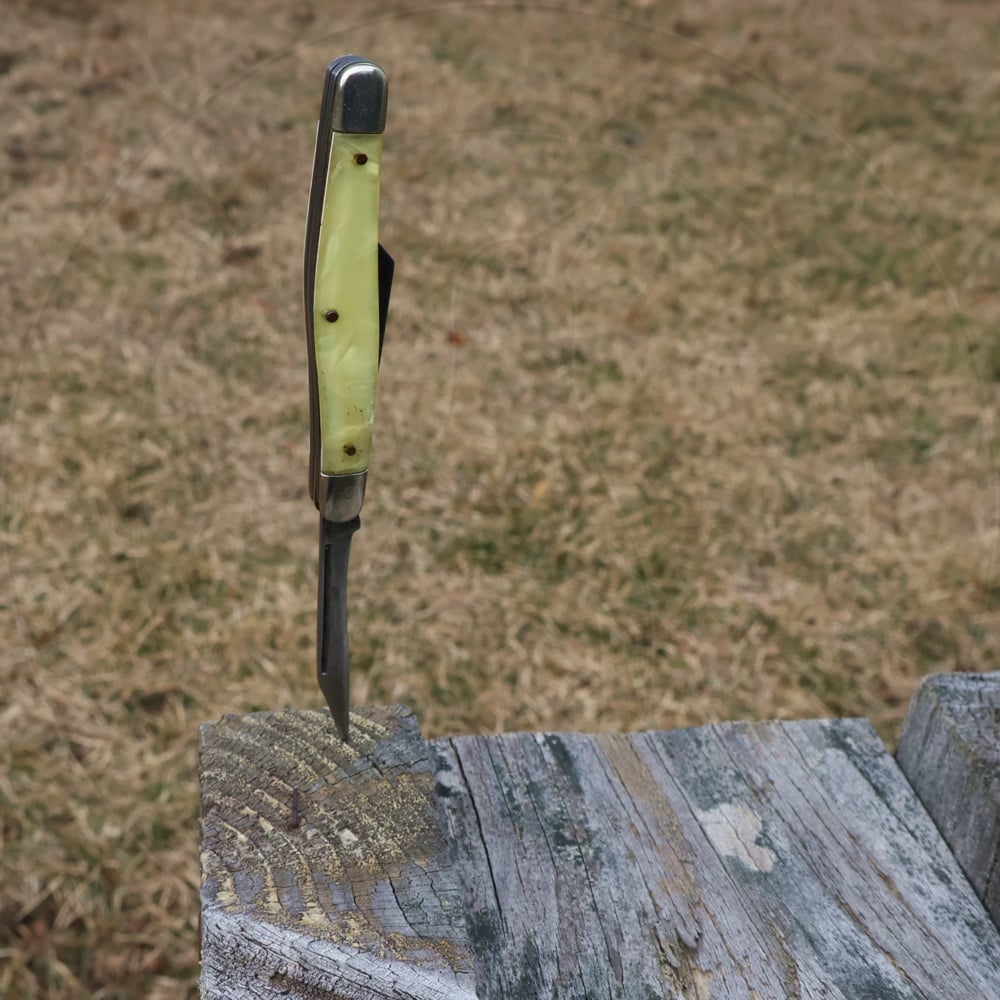
But you could have saved a billion dollars and cancelled NASA right then and there. Just strap a camera to me and I'll take pictures on my way by, because I was headed to the moon.
I strutted around that whole summer with that knife in my pocket just as proud as a cat full of sixpences. If anything needed cutting, by gum I cut it. Or pried it, or scratched at it, or carved runes into it, or whittled it into a point. And I took it home with me.
I flew to and from my brother's place every summer, ostensibly on my own but under close supervision of whichever stewardess was unlucky enough to escape being cornered by my mother and browbeaten into taking responsibility for me. They let you do that sort of thing back on those days, just bundle up a 7-to-11 year old and stick him on a plane by himself.
Well, I ambled right up to that damn metal detector and stuck my knife in the tray along with my watch and my Gameboy and all my loose change. The security guard picked up my knife and looked me up and down, me in my denim jacket and khahki cargo shorts and ballcap, patches and pins, and a bandana around my neck.
"You in the scouts or something?" He asked me.
"Sure," I lied.
"You be careful with this," he said, and gave it right back to me.
What a time to be alive.
Through that arch I passed on to the rest of my life, forever changed but surely without any clue whatsoever what I might go on to be. Backpacker, adventurer, writer, deliverator, programmer, collector. In that moment, it was all possible.
I hid my knife in my sock before we landed. I had correctly predicted that my mother would snoop through all my luggage and brusquely rummage in all my pockets as soon as she saw me with barely even a hello.
In retrospect, it's a goddamn miracle I managed to hang on to this thing to be able to show it to you today. If she'd found it at any time she'd have thrown it away after first calling me on the carpet over it and probably grounding me for a month, and certainly would have utterly failed to understand its significance. It'd be a half hour screaming telephone call to my brother as well, long distance charges be damned. No hiding place in my room was safe; Ultimately I resorted to tucking it in the rafters of the disused shed on the corner of our property along with all the other stuff I didn't want to lose forever, until I moved out.
I knew nothing about this knife, really, except that it was old and it was my brother's and he gave it to me, therefore it was priceless. I didn't get into-into knives until a little later in life, well into teenagerdom and a time where such a lad could charitably pass for legal age to a suitably disinterested store clerk and purchase cutlery of his own.
And I did eventually get my damn Swiss Army Knife, but a little too late.
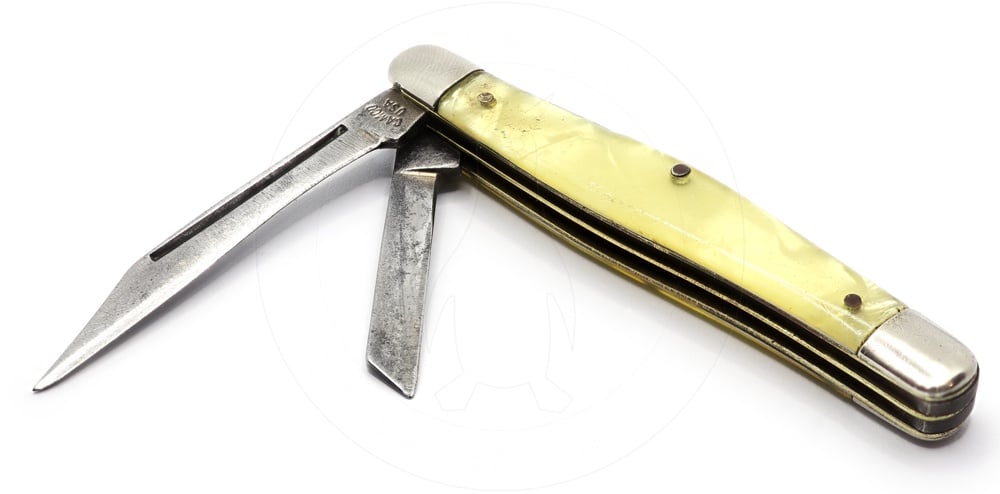
This is a Camco Model 522. Camco was one of two historical sub-brands of the Camillus Cutlery Company, from back in the good old days before their 2007 bankruptcy and subsequent acquisition by Acme United, the following restructuring, and infamous descent into being a clearinghouse of mostly imported low grade junk for Walmart.
In its heyday Camco was their budget line, opposite the Sword brand which contained their high end offerings. Its origin is displayed via this engraving on the heel of the main blade. Camco, I imagine, is short for "Camillus Company." The brand was introduced in 1948, just in time for post-war prosperity.
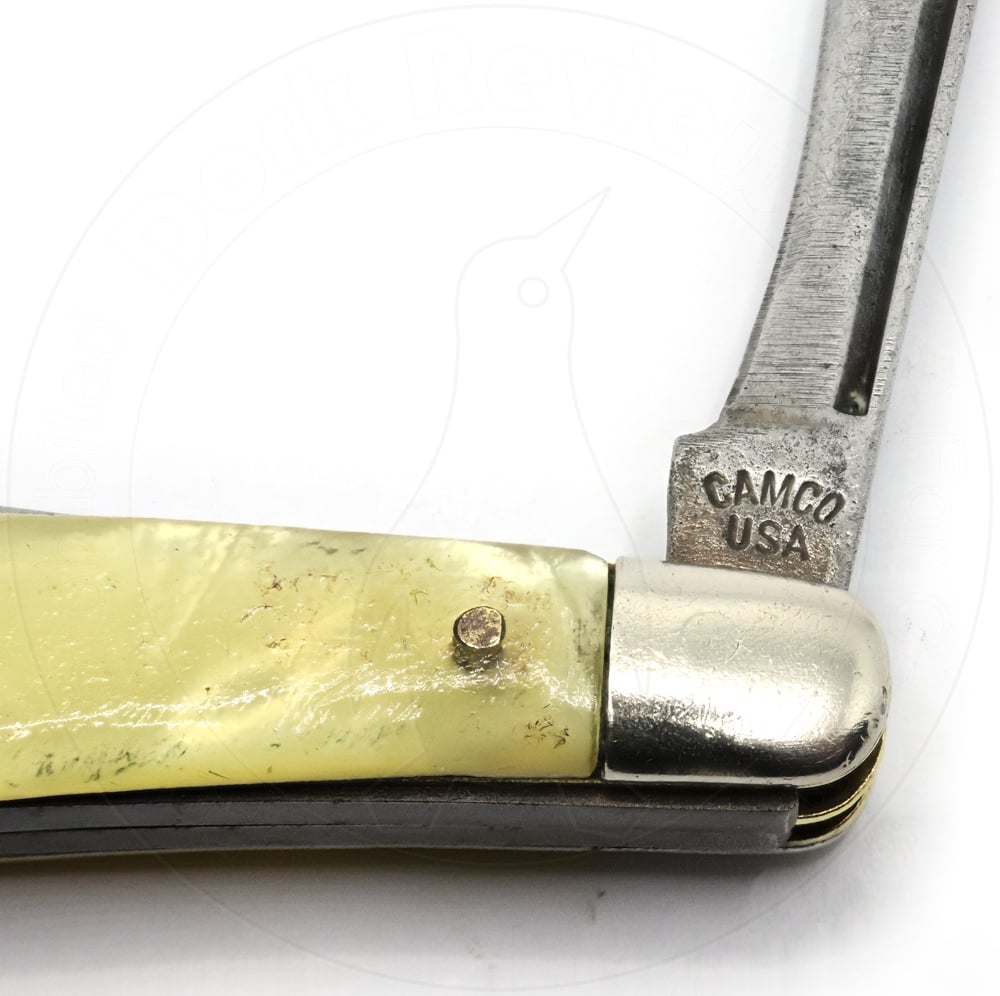
The 522 is a fairly traditional jack knife, bearing a pivot on only one end rather than both, and Camillus specifically called this variant a "Pony Jack." It's arguably a swayback design, evidenced by the prominent wiggle in its handle profile. The 522 Pony Jack contains a long clip pointed blade:
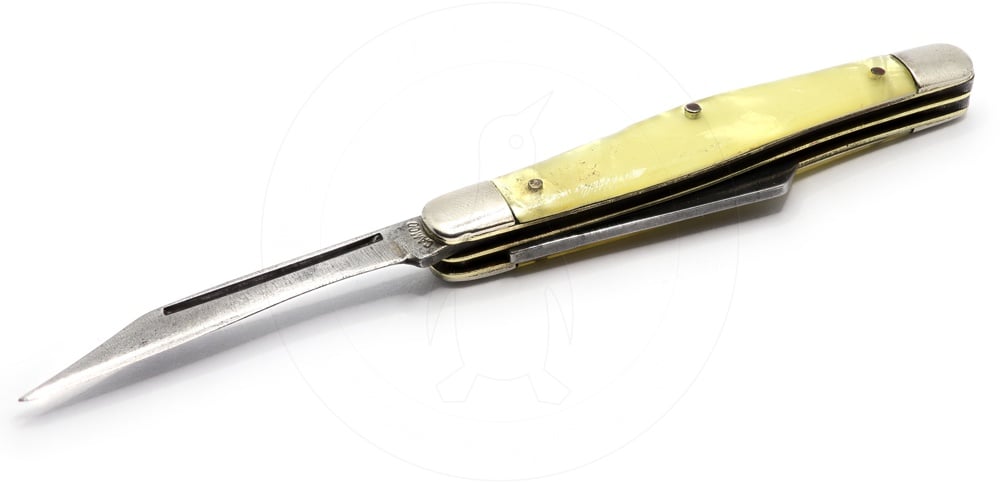
And a short sheepsfoot that Camillus called a "coping pen" blade:
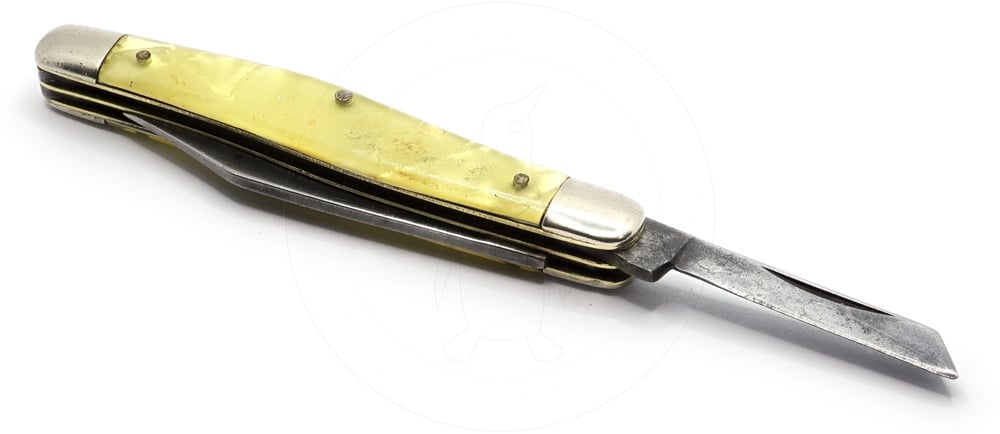
The handle is "Nu Pearl," which is a translucent plastic faux-pearl material -- Plastic being a novel material at the time of its introduction, and quite distinct from the stag horn that Camillus used on most of their knives up to that point.
As a side note, the reason small knives like this are still called "penknives" by some regardless of their configuration is because similar small knives were originally intended to shape and trim the point of a quill pen, back when that sort of thing was relevant. Even well after quill pens fell into disuse the name stuck. This is surely where the "pen" part of the description of its smaller blade comes from. A coping blade has a narrower point profile than a traditional sheepsfoot and is supposed to be better suited to finer, more fiddly tasks at the expense of having a more fragile point. And it's certainly possible that Camillus might have expected you to trim a quill point with it, but I'd doubt it -- a pencil is probably more likely.
I don't actually know the date of manufacture of this knife. It's not marked on it anywhere, and the only published reference I can find to this model specifically is in the 1957 Camillus catalog where it appears twice. Page 5 contains as full of a description of this model as it appears we're going to get:

And two pages following you can see it as part of the lineup in their No. 56-12 display case, revealing that this was part of the Camco "Dollar Line." It is therefore definitely a budget model. Perfect for bestowing on a grasshopper who probably wouldn't treat it with much care.
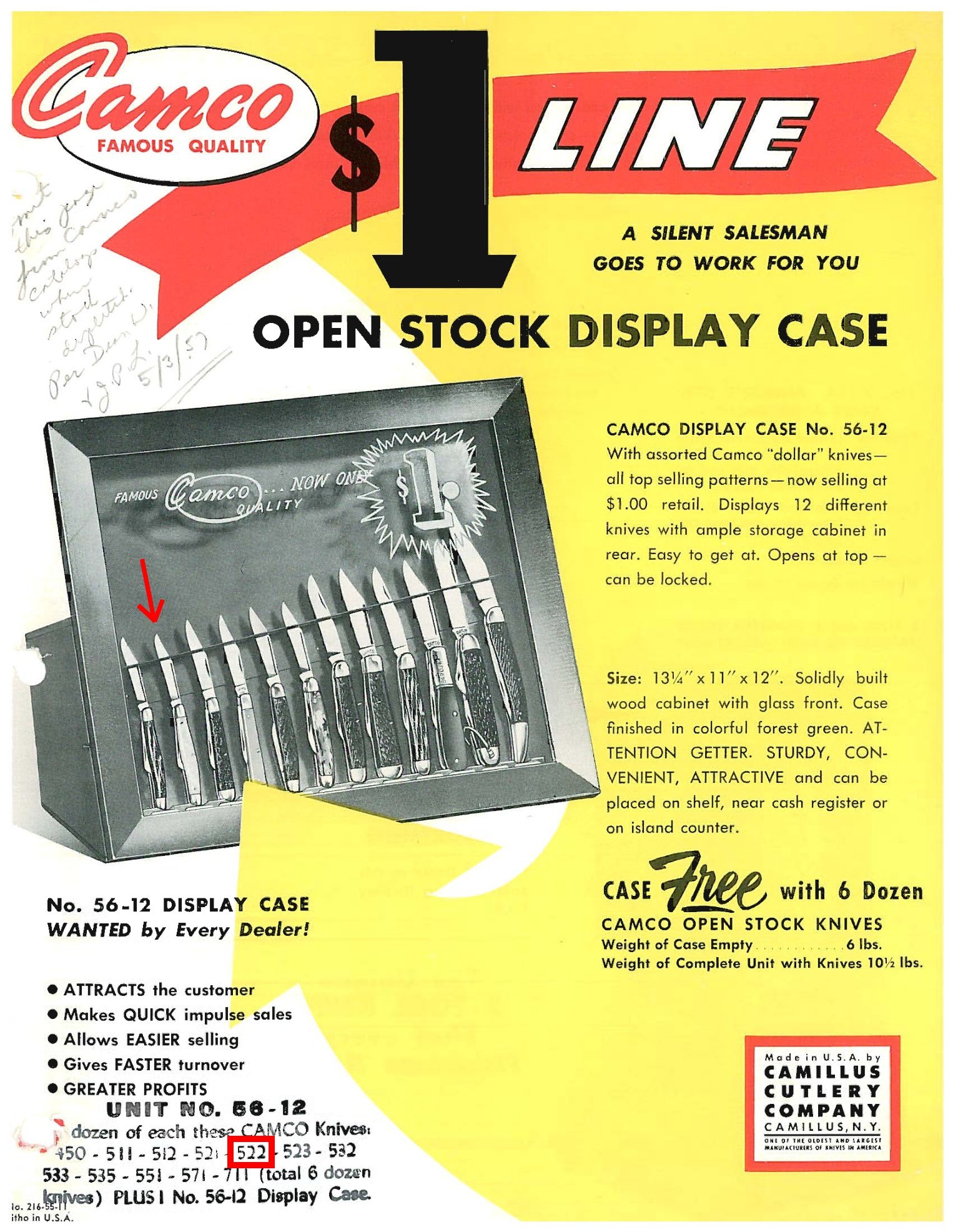
I don't know how long Camillus kept this knife available and in production, and it's certainly likely that it was available beyond 1957. Just as well, because '57 was certainly before my brother was born (I'm not that old, and neither was he), but I can just picture him picking this up from a hardware store in some dusty one horse town somewhere where it may have been lying around for god knows how long. Or it's even possible that it was given to him in turn and then given to me; that raises the tantalizing possibility that I am this knife's third owner but at this rate I'll never know.
I found this catalog and many others like it at the excellent Collectors Of Camillus web site, by the way, which is a veritable treasure trove of info run by people who know way more about this stuff than I do. Without it I certainly would have been scratching my head much longer in figuring out anything about this knife. I found various similar eBay listings for knives like these, for instance, most of which were quite inaccurate.
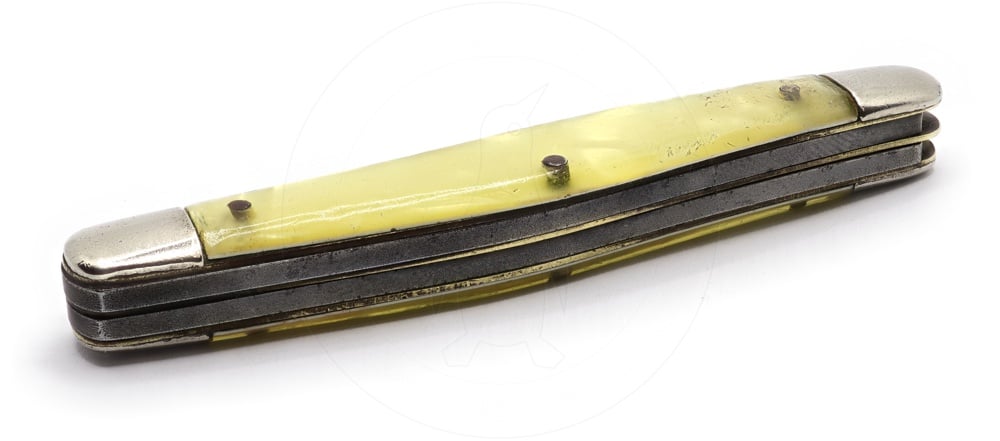
I've shown off knives here before that were time capsules of their era, but none of them are a patch on the 522. It is a very traditionally designed pocketknife, and when I say that it really means something here. It's a slip joint folder with no locking mechanism. A pair of springy prongs on the spine press against the heels of the blades and allow them to detent into position but they are not locked there in any way.
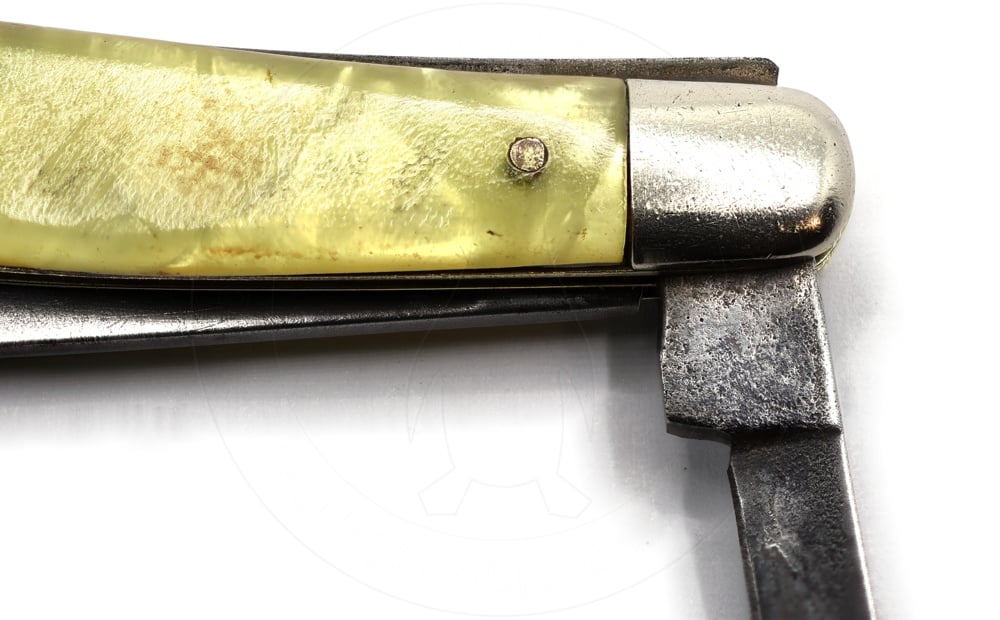
Its steel alloy is unspecified, but I can tell you for sure it's a carbon steel and not stainless. Nowadays we assume any given knife no matter how cheap is bound to be stainless, and if you want a carbon steel blade you have to deliberately seek one out. None of the knives in the 1957 catalog are specified as being stainless, and when Camillus came out with models in later years that were it was a big enough deal that each and every one had a flashy "stainless" marquee over its listing.
These days we hyperfixate on specific steel alloys and the minutiae of their properties, but back in the day people were much too occupied actually using their knives to worry about that sort of thing.

And my example is definitely well used. The rather pronounced dish in the edge on the main blade is not original, and is a clear indication that somebody got an awful lot done with it at some point in history. Some of that was me, but much of it wasn't.
The 522 is riveted together with steel pins that are functionally nonremovable. A real expert could probably dismount it and put it back together again, but I'm not inclined to try. Mine has suffered much neglect over the years what with being hidden in sheds and down in the bottom of drawers and so forth, and at one point it was underwater for some length of time after my house suffered from a basement flood. As you see it now is after my inexpert attempt at restoration; I gave it a damn good brass wire wheeling before taking these pictures to shine it up and get the rust off of the bolsters and out of the Nu-Pearl scales. I mostly succeeded. The blades have developed a patina and some pitting, particularly on the smaller one, and I decided that by and large I'd leave that as it is. I got all the cancerous red rust off and oiled everything up real good, but I think going around trying to mirror polish the blades would be silly.
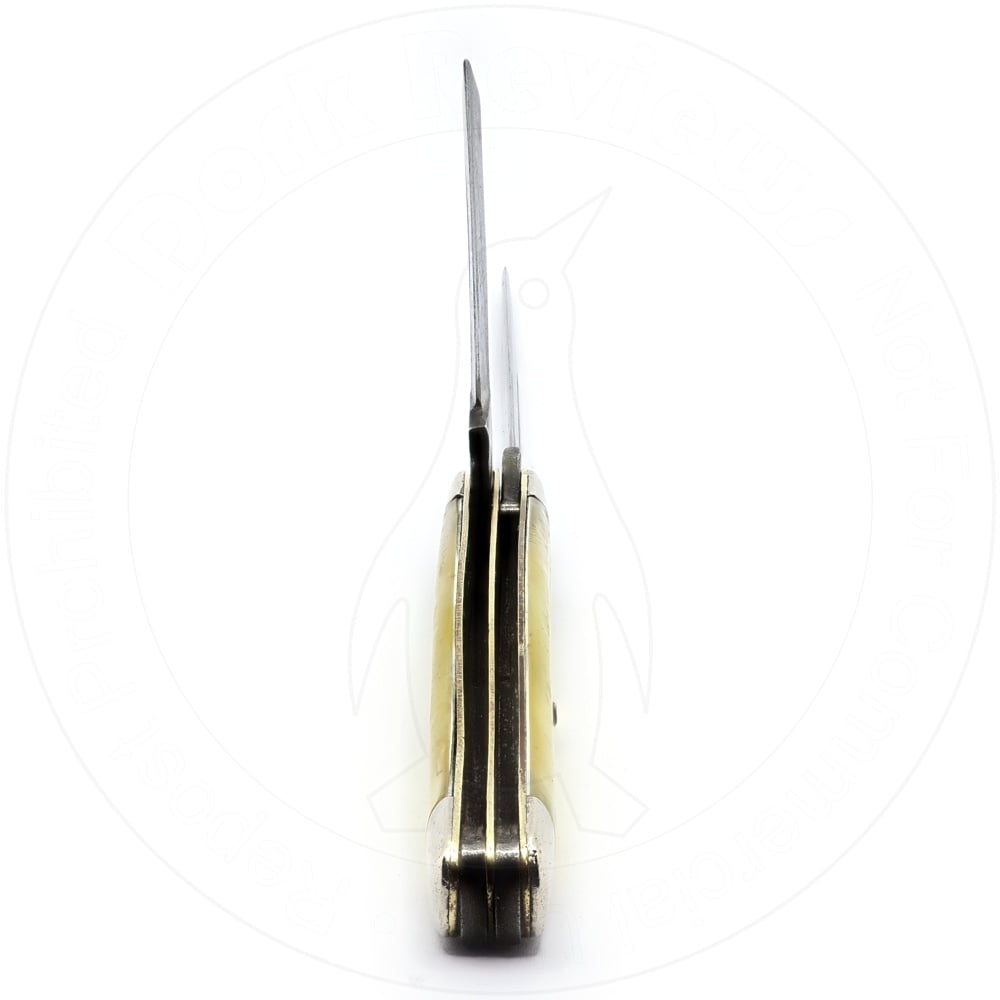
Both blades are spaced by a simple brass partition in the gap between. The long blade on mine is actually very slightly bent -- no doubt the result of some youthful misadventure -- and I straightened it out as much as I dare try. It's not perfect, but at least the blades don't clash anymore and I've seen worse even in new production knives if they're cheap enough.
The sky was turbulent all that day. Big tall clouds came and went, sweeping across the sky one after the other. We met up with my brother's friend Mark for lunch, out on some rocks on a pine covered hillside somewhere. He prepared tortellini on a little pump up white gas camp stove on the tailgate of the truck, with a can of red sauce he opened with his knife.
We let his dogs out to run in the brush and hunt mice and voles, which was their favorite game aside from rooting out grouse. You'd hear just one bark from the bushes and suddenly there'd be a tiny rodent sailing over the low pines and sage, looking quite surprised and indignant. The dogs never killed them, they'd simply catch them and fling them into the air so you could see that they'd got one. My brother could actually even get them to bring their quarry back, alive, and this was how he fed his bird.
Pasta was done. We sat in the shade under the pines as the wind rattled the dry branches. My brother glanced up at the sky.
"Get in the truck," he said suddenly. It seemed quite out of the blue to me.
We got in the truck. Just a minute later, a deluge of marble sized hailstones were bouncing and pinging and shattering all around us. And here came the dogs, rocketing out of the bushes and yelping. They got in the truck, too.
The chaos only lasted a couple of minutes and I did my best to catch a few of the ice balls by tentatively hanging my camp mug out from under the safety of the pickup truck's cap. I only got two or three, and they melted quickly.
To this day I have no idea how he just looked at the sky like that and knew it was going to hail 30 seconds later. That was the kind of thing he did. He was in tune with the land. Anywhere he stood, that was his land. It didn't matter what any signs around it said.
That summer we went everywhere. Hundreds of miles all over the state and beyond. We went to the Four Corners, just for the heck of it. We got lunch in roadside biker bars that a 10 year old had no business in. You'd get looks at first, but my brother -- scrawny, liberal educated, and beardless -- could be friends with anyone in any bar in sixty seconds flat. His dogs knew tricks. He'd dazzle the denizens hunched over their beers with trivia, or win small bets along the "bet you a quarter you can't do X with Y" variety, or once he taught me a few he'd let me do it instead. (For instance, he taught me the trick I've recounted here before of uncorking a wine bottle with no tools, just physics.) Anywhere anyone was from, he'd been there and he could prove it. He knew people that you knew there. He knew people everywhere.
And then, we were gone. Probably leaving everyone inside wondering just what the hell just happened.
We camped on mountainsides in the middle of nowhere. Fished in remote streams -- Well, he fished and I watched. On those nights, I saw more stars in the sky than I'd ever seen in my life. And he seemed to know the names of all of them.
It's funny, but the Camco 522 is exactly the kind of knife that doesn't interest me now. I own precisely two traditional jackknives, and this is one of them. We all got preoccupied with spring assists and thumb studs, myself included, and I developed my now famous predilection for balisongs as well as the most off-the-wall mechanisms I could get my hands on, but the 522 has none of these. It's also seriously tiny -- It has no tactical appeal at all. All you have to grab the blades for opening are traditional fingernail nicks, and the action is quite stiff. I recall it always was.
It's a mere 2-3/4" long closed, just like the catalog says. The main blade is just 1-13/16" long, probably well within the legal limit anywhere, and the little one is 1-5/16". It's just 23.8 grams or 0.84 of an ounce. All that together means this would probably give any modern urban micro-carry knife a run for its money. The diminutive size is surely why my brother chose this one to give to me. It's tough to get into too much trouble with, but it'll still teach you not to nick your fingers just as good as any other knife.
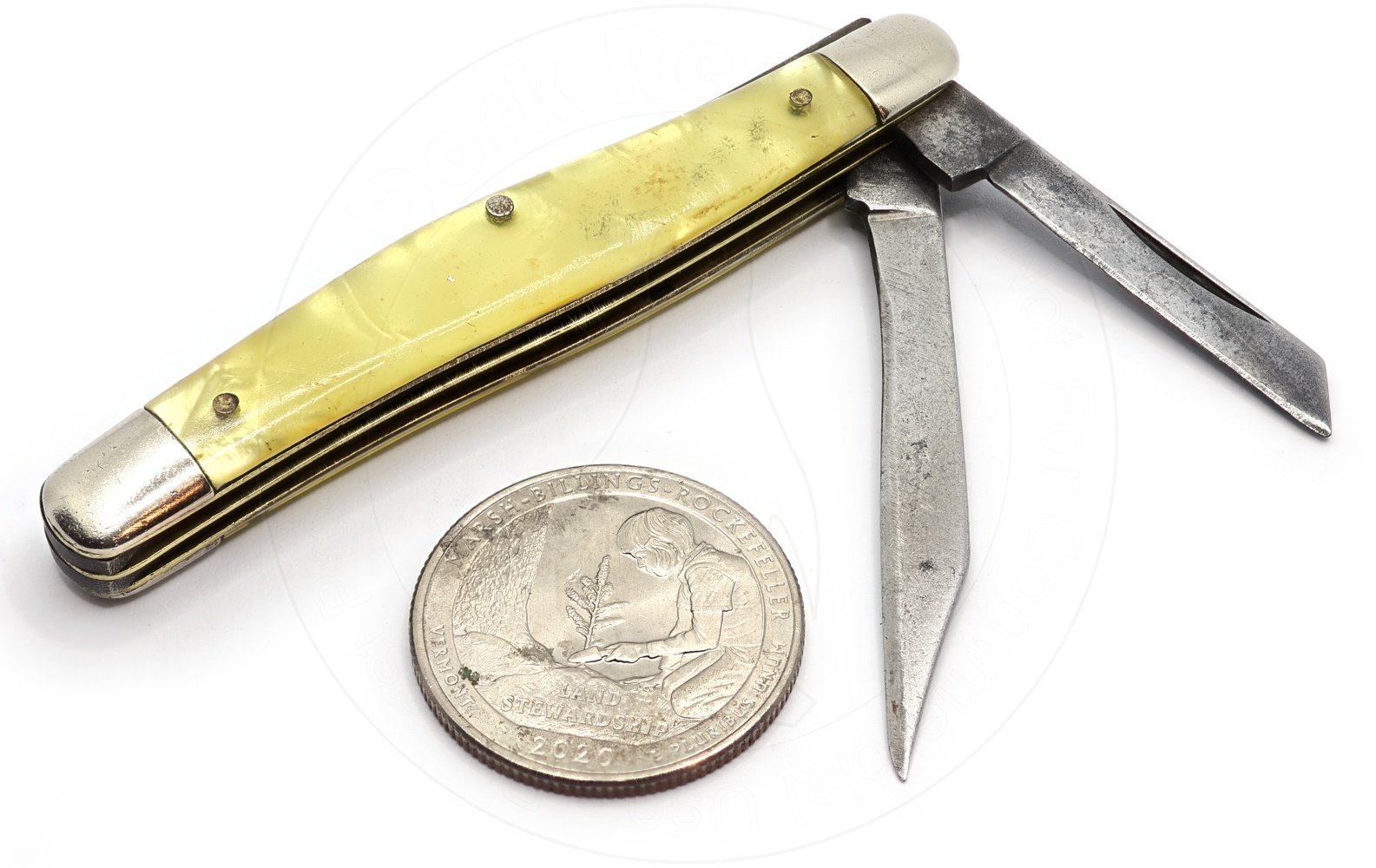
I was going to try to find a Wyoming quarter for scale since it'd be appropriate, but I pawed through about 40 bucks' worth of quarters I've got lying around here and I'm ashamed to report I didn't find a single one. You get this land conservancy commemorative one instead, as second prize.
I visited my brother one more summer after that, a trip during which I turned eleven. On this trip my nephew was sent with me (he's almost exactly my age; my family tree is weird) and we had a grand old time even though I had to leave my little pocketknife at home. We had other toys to play with -- hatchets, now, and my brother let me carry his Buck knife while I was there because he had yet another new knife. And I had a little half height small headed D-handle shovel I found in the barn and took it in my head to use as a walking stick, prybar, and general purpose snake-fender. Any bears or coyotes or rattlesnakes that messed with us had better watch out because they were going to get a good thrashing. Luckily for them they all kept their distance and remained un-whacked.
One night that winter, my mother woke me in the middle of the night so in tears she could barely talk. She told me my brother had just died, having been killed in an avalanche on the side of some mountain someplace. It was one of the few times I ever saw her display anything I could classify as a genuine emotion which wasn't just being angry at me or my dad.
What a thing to lay on an eleven year old in the dead of night. It's the kind of bullshit that happens in dreams; it can't be real. I didn't know what to say, so I said nothing. I get the impression that this was the wrong answer.
In the morning it was real -- it wasn't a bad dream. I never saw my brother again, and I think it probably took years for that to fully sink in. He may as well have lived on a different planet at that time. Life there wasn't the same life as here.
He did, at least, go out doing exactly what he wanted to do, exactly where he wanted to be.
I didn't have much to remember him by, and I still don't, at least in a physical sense. I had pictures, taken with a succession of wind-up plastic disposable cameras, all whisked away to somewhere by my mother. Those were her memories now, not mine, to be scrutinized and locked away; at the time they were her way of keeping tabs on me even when I was elsewhere. After all, I was told, she paid to have them developed. I didn't deserve to keep them -- I wouldn't be "responsible" enough anyway. I didn't "understand."
I don't need pictures to remember anyway. I have real memories, and they're better.
The only actual things I had left were this box and this knife.
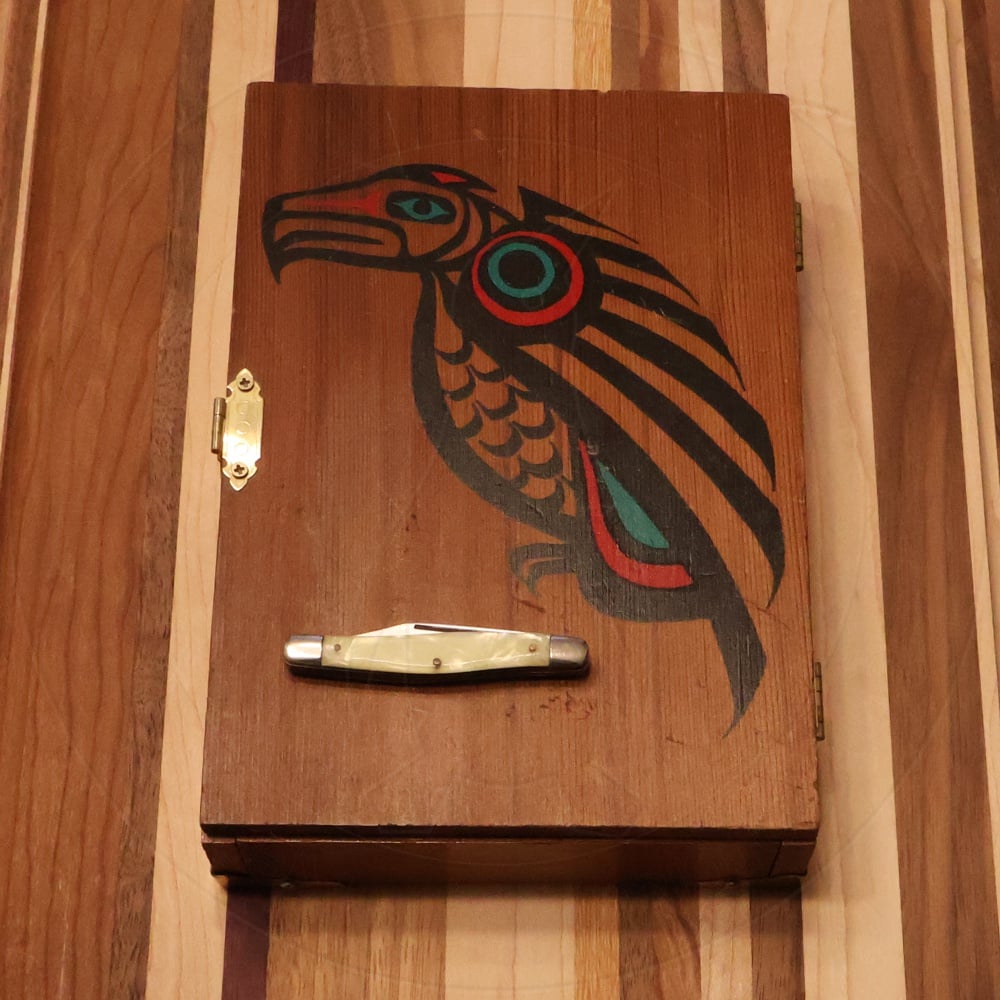
The box originally held watercolor pencils. These were another extravagance my brother let me keep, and something I didn't get to reacquire at home after I'd used up the originals until much later. When he gave it to me it was plain, just a drop-fit lid and nothing else. I sealed the wood and added the hinges, the latch, and the corners later, after it was clear this was now a memento.
And his knife.
My knife.
I have a lot of knives, now. Some have memories attached, most don't. Many of them have seen more use, and a couple of them have seen none. But none of them will ever be equivalent.
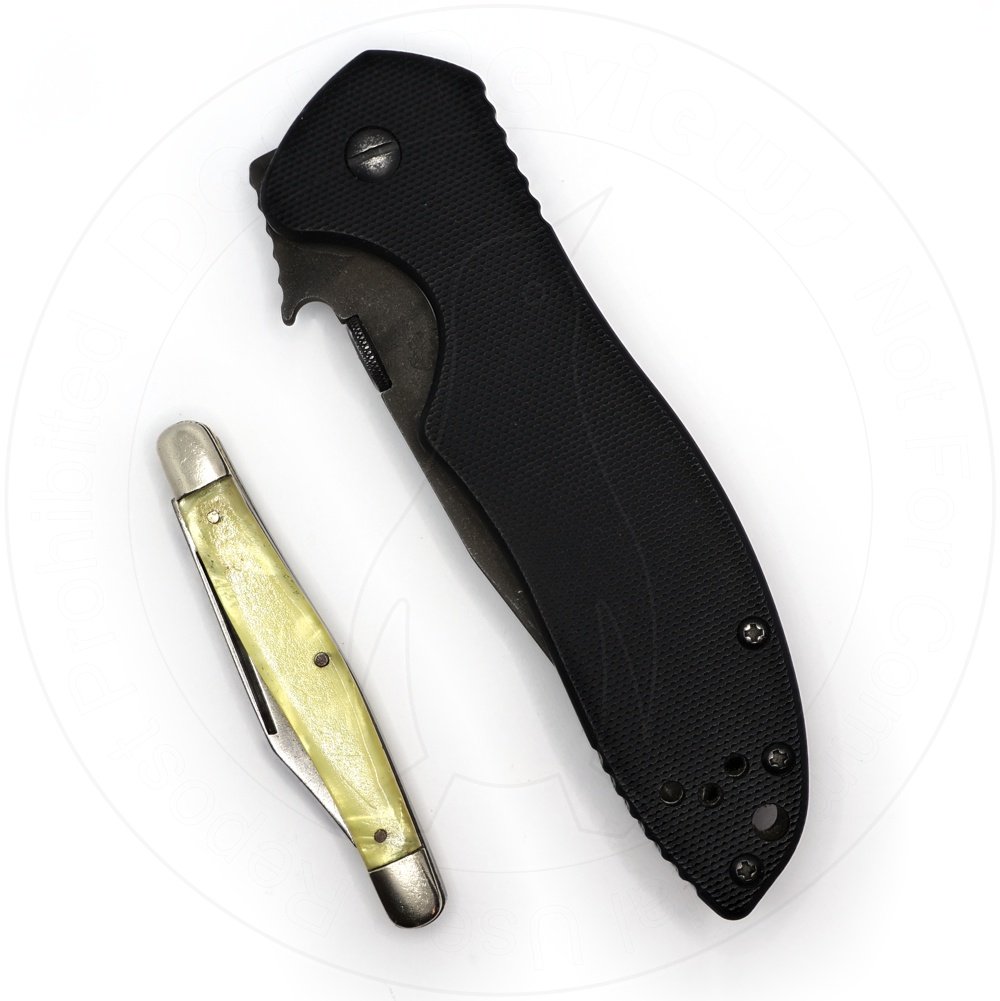
All of them are my knives. Some of them are really my knives; the ones I designed.
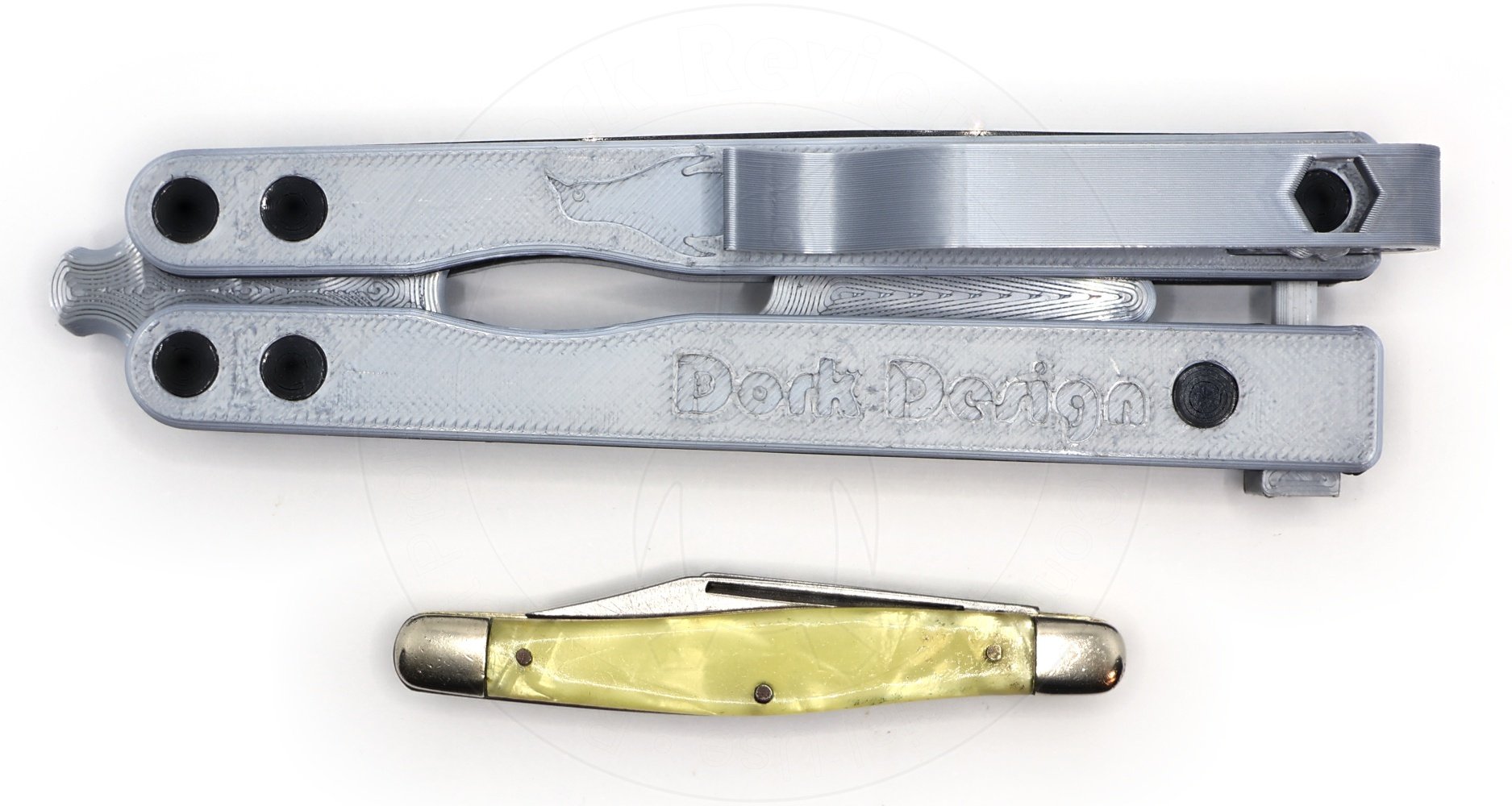
I have to imagine he would have been interested in that, too. But this little Camco is Genesis and it always will be.
As people, living in civilization as we are, it seems we're hard wired to ascribe significance to objects. People don't last forever but objects can. Maybe this is why we're always so keen on preserving them.
This is probably why museums are full of things, and they aren't just one old guy in a rocking chair who was actually there, recounting his story in person to anyone who'll listen. We see these historical things, often personal effects -- someone's powder horn, someone's pen, someone's pair of spectacles, a monographed snuff tin, whatever it is -- and we think that's what history is because we know they belonged to somebody.
Maybe it's true.
Everyone has a story. Maybe a banal one, not an important one as far as history is concerned. But everybody still does nonetheless. You never can tell what significance things have to someone, or how they remember the people, the places, the events that are important to them. Why do any of us do what we do? We all have our reasons.
Think about that before the next time you're about to call something stupid. Before you say it's "just" a knife and what's the big deal? Or maybe it's not a knife and it's a baseball card, or an old hoodie, or a page torn out of a book.
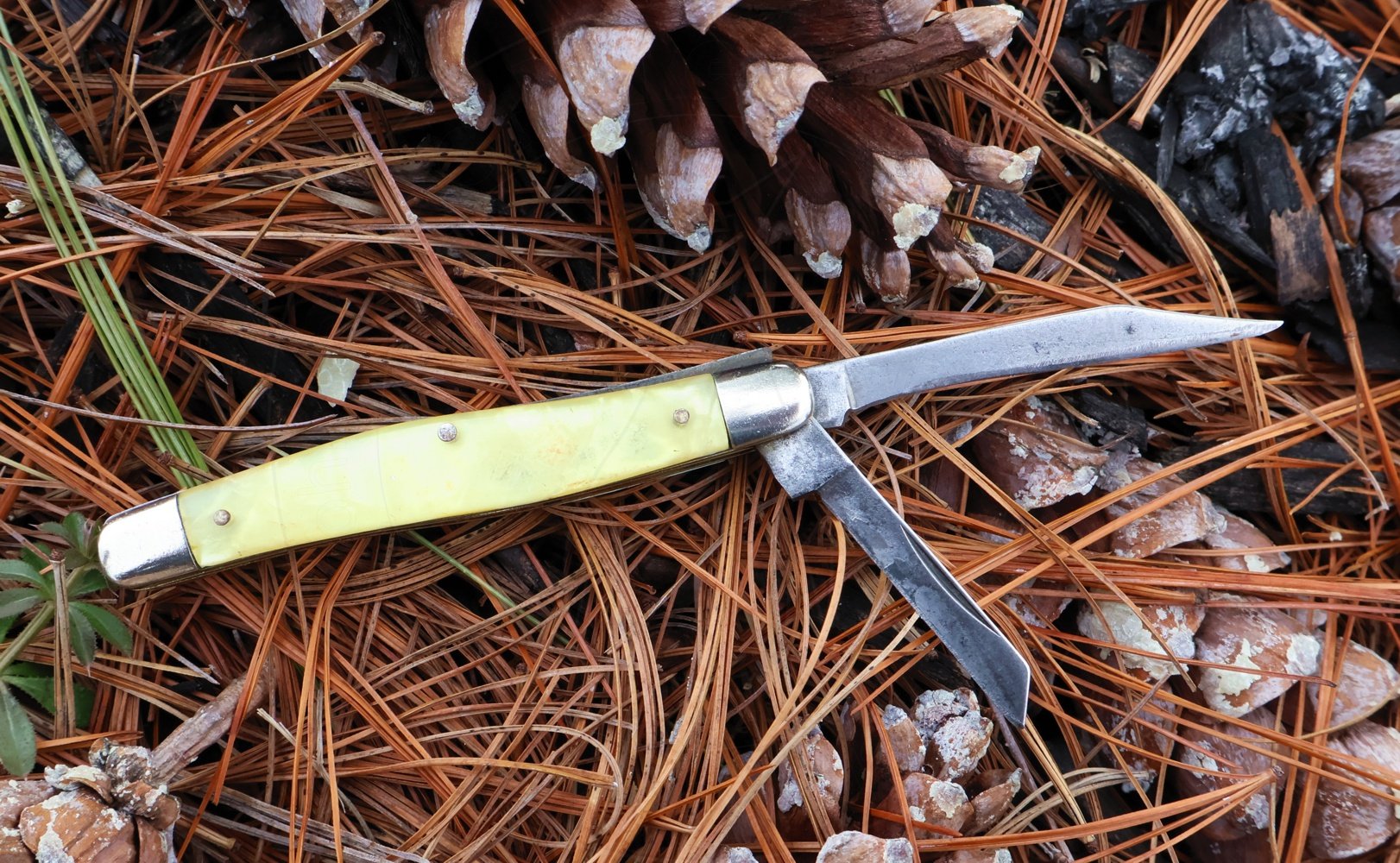
I have hundreds of knives by now. Many of them are "worth" tens, even hundreds of what this one is just in base dollars and cents. But not a single one of those is locked in my safe.
This one is.
It is said that people are never truly dead until what they leave behind is gone, and the last mark they've made on the world is forgotten. My brother certainly left his mark on the world, in all sorts of places. And of course he left it on me as well. We can all still live by his words of wisdom: When you venture out into the rocks and pines, keep your canteen full. Know where you're going and know where you've been. Watch out for snakes. Always have your knife.
My brother died getting on for 30 years ago, now. I'm slowly turning into an old man, much older now than he was when he died. That's how it goes.
Part of what he taught me is what he taught me by his absence. It's the knowledge that you should plan for the future, sure, but always live in the moment a little bit.
Some day we will all do something for the last time. One trip will be your last camping trip. One ride will be your last ride. One knife will be the last knife you buy.
One time you see your brother will be the last time. And you won't know that's what it is.
